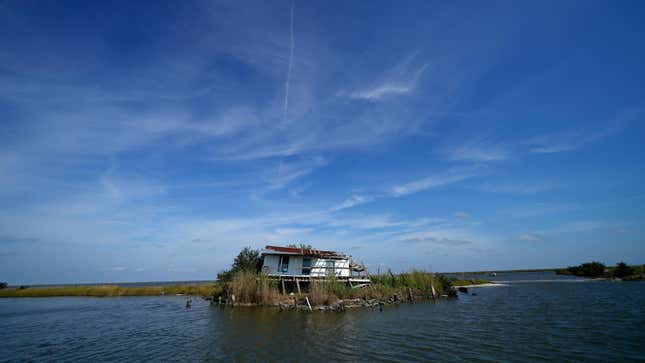
A glass recycling and shoreline restoration project in New Orleans was inspired by a bottle of wine. Cofounders Franziska Trautmann and Max Steitz met as students at Tulane University. One night, over drinks, they lamented about how their wine bottle would just end up in the trash, because New Orleans does not recycle glass.
“We were like, ‘why is this going to the landfill when it could be used for so many other things and be recycled and repurposed?’ So we decided to do something about it… however small that something may have been,” Trautmann told Earther.
After that fated wine bottle, Trautmann and Steitz launched a GoFundMe in order to buy a small machine that would turn glass into sand one bottle at a time back in February 2020. Glass Half Full was born. They purchased the machine in March, and then the pandemic shut New Orleans down. During that first year of covid-19, a Glass Half Full TikTok account helped them grow the operation despite the pandemic. They now have over 260,000 followers and who watch their videos about recycling food-grade glass that would have otherwise lay in a landfill for thousands of years.

Glass Half Full wasn’t able to jump into coastal restoration right away, but last year it received a grant of $700,000 to help them study whether their recycled sand would work in natural environments. Louisiana’s rapid shoreline erosion presents a multitude of issues for the state. Since the 1930s, the state has lost enough land to make up the entire state of Delaware, according to shoreline restoration nonprofit Mississippi River Delta. A number of factors have worsened the issue over time, including oil and gas drilling along the coast and the many tropical storms that have pummeled the state.
The sand created from the recycled bottles is useful for several climate resilience needs, like filling sandbags to hold tarps onto a home without having to use nails that could later rip material. Coarse sand can be put back into natural coastal areas that have eroded. Reinforcing the shoreline with recycled sand can prevent flooding from going farther inland.
“The coarse sand is what we’re using for restoration projects because it will not erode as quickly. It won’t get suspended in the water column, so the coarse sand is just really good for those projects,” Trautmann explained.
This past weekend, they completed their first demonstration of how their pulverized glass bottle sand could be used along Louisiana’s shoreline. A TikTok video shows the co-founders, community members, and volunteers out before sunrise. Completing the demo took 12,000 pounds of recycled glass and 35 volunteers. They worked to install a gravel drain and planted native plants in the recycled glass sand, in a collaboration with the local Pointe-au-Chien tribe.

“That was always a goal since we started the project. We were like ‘oh, we can turn the glass into sand’.... [it’s] so necessary for coastal restoration,” she said.
Their glass repurposing operation started in a backyard and moved to a small warehouse, but increased demand has prompted them to take over a 40,000-square-foot warehouse built on a former landfill. It’s run by just six employees, including the founders, and there are over 1,000 volunteers who assist with bottle collection.
Trautmann estimates that they pulverize about 100,000 pounds of glass per month, and they expect that to increase soon. Glass Half Full encourages locals to drop off their glass at hubs for free, and they offer a monthly pickup service to businesses for a fee. The goal is to hopefully expand across the state and to partner with organizations and local agencies that want to tackle waste management and Louisiana’s erosion problem.
Now that their glass has been cleared for natural environments, Trautmann envisions a larger staff and more volunteers for even larger collaborations and demos. With the first demo behind them, Glass Half Full wants to push for more coastal restoration projects that will help protect the state their operation calls home.